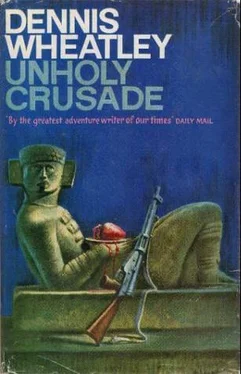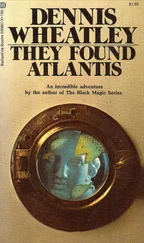Ramon dropped Adam at his hotel and that evening sent him several pages of typed notes, listing the hotels into which he had booked him and places of interest he should not fail to see during his trip. Next morning a cheerful looking Mestizo, who introduced himself as Felipe Duran, arrived with a car and they set off.
They reached Queretaro soon after midday; so Adam was able to have a good look round the old Spanish town before lunch, then do the forty miles on to San Miguel de Allende where he was to stay that night. In the fine church there he got into conversation with an elderly priest. Secretly amused by the thought that he was now an unofficial secret agent, Adam entered on his new role and asked him about his work.
The priest said that there was always plenty to do but, unfortunately, never enough money to do it with. As in most parishes, they had many old and ailing for whom the State did nothing, and the Church was hard put to it to give them even a modicum of the attention they needed.
Taking the hint, Adam produced a hundred peso note as a contribution to the poor box. The priest, from being merely polite, became quite cordial, showed him the treasures of the church, asked him to what other places he had been and, when he learned that Adam was gathering material for a book, said, `I hope that when you write it you will not, like most foreign authors, tell only of the modern Babylon that Mexico City has become, but also describe the real Mexico and the harsh life led by her people.’ Is their lot a very hard one?' Adam enquired naively.
`Deplorable,' replied the priest with a shake of the head. `When I was a younger man I had a parish up in the Sierra Madre Occidentale. It covered eight hundred and fifty square miles. In it there were over thirty villages and I was the sole stay of their inhabitants. To many of the villages there were no roads, only mule tracks. I spent my life riding from one to another, ministering to the bodies as well as the souls of my wretched parishioners; for no doctors ever go to those places. Tuberculosis, malaria, dysentery and rickets due to malnutrition are rife in such sparsely populated areas; so a medicine chest is a part of a priest's equipment and he does what little he can to relieve the afflicted. He is also their counsellor in family disputes and all matters concerning the commune. Their poverty is such as to wring the heart. They are truly devout and willingly give what little they can to support their priest; for he, too, must live, albeit on a pittance. But so near the starvation line are they that in some cases the only church they can afford is a single room with not even a confessional in it. Write of these things, I pray you, senor, for if the rich were made more fully aware of the miseries the Indians suffer, they might prove more charitable.'
Much moved, Adam said good bye to the old man, whom he could not possibly believe was involved in the conspiracy. But it did strike him that peasants leading such a grim existence, and with nothing to lose but their lives, would prove easily inflammable material if called on to right their wrongs by a priest who was a firebrand.
That evening, instead of drinking and dining at his hotel, he visited several cafes and ate in a small restaurant. The people to whom he spoke were invariably most courteous and talked with him on a variety of subjects, but he picked up no information of interest. Early next morning Felipe drove him the few miles to Guanajuato.
There he looked in at the charming little horseshoe shaped theatre with its tiers of gilded boxes. At the church he got into conversation with a younger priest, a gloomy dark skinned man who evidently regarded him with suspicion and, as soon as he mentioned the poverty of the Indians, shut up like a clam.
Early in the afternoon he reached Irapuato, where he was to spend his second night. At the church he could not find a priest; but he passed his evening scraping acquaintance with people in the cafes and, when he had his dinner, shared a table with a commercial traveller who sold patent medicines. He was an urbane type, full of information, but not of the sort that Adam was seeking. With pride he talked of Mexico 's industrial revolution: New factories were going up everywhere. Production had tripled in the past quarter of a century, and was still increasing at the rate of seven per cent a year. He knew little about the Indians and cared less.
On the Thursday, Adam went on to Morelia. The town was situated in some of the loveliest country in Mexico. He found the Hotel Mendoza there much superior to those he had stayed in earlier during his trip, so he was glad that he was to remain two nights. But he spent most of his time out and about talking to people who were sitting alone outside the cafes.
As had been the case in the other towns, nearly all of them were drinking tequila, the national spirit made from cactus, and, at intervals, sucking a piece of lemon sprinkled with salt. Adam did not much care for tequila but, to be sociable, he always ordered it, although in the form of a tequila Collins, as drinking it with ginger ale made it more palatable.
Nearly all the people he talked to turned out to be small townsmen, so from them he did not learn much. Most of them were of the opinion that the Indian peasants had never been far above the level of slaves and, until education became more general, would remain in that condition. But a few said that it was believed they had recently been forming some sort of organization to better themselves.
That evening, as a change from the fiery curries with which he had had to make do in small restaurants, he decided to dine at the Mendoza and, after dinner, he had a chat with a man who introduced himself as Don Augustin Flores. He was the owner of a big estate and gave Adam the opposite side of the picture he had been given by the commercial traveller.
Don Augustin said that Mexico was heading for ruin owing to the drift of the peasants to the cities during the past two decades. The deforestation of the land by the Spaniards had greatly reduced the conservation of water, with the result that many areas that in the old days had borne crops had deteriorated into arid wasteland. In consequence, for centuries there had been barely enough food to feed the population. Since the end of the Second World War the situation had further deteriorated because, tempted by the higher wages although, owing to the high cost of living in the cities, they were little better off great numbers of peasants had left the land to take jobs in industry as unskilled workmen. The result had been a further great reduction in the area of land cultivated and a steady decline in the amount of food produced.
Don Augustin predicted that if this drift to the cities continued, as it almost certainly would, within a few years the price of food, whether home grown or imported, would become so high that the peasants would not be able to pay it, and they would then begin to die like flies from starvation or, in desperation, rise spontaneously and march on the cities with the intention of bringing about a revolution.
Adam was deeply interested in all this. Ramon had told him that Mexico was already importing large quantities of food, with the result that prices had risen. Evidently this was one of the causes of the peasants' discontent; although apparently Don Augustin was unaware that a revolt was already in the making.
The following day Adam enjoyed a most picturesque drive to Patzcuaro, near which there was a beautiful lake. Then, in the evening, back at Morelia, he met another interesting character, a retired schoolmaster named Juan Padilla.
The Senor Padilla was a fiery Liberal. He had spent his life in schools and agitating for more of them. It was his belief that education was the panacea for all ills and he was full of praise both for the government's endeavors in that direction and the people's willing acceptance of them.
Читать дальше












